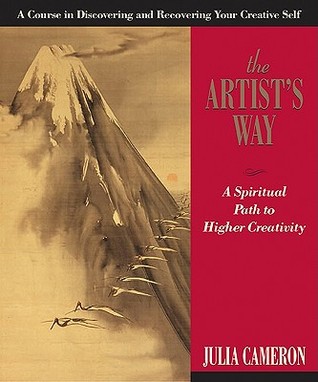The Artist’s Way
By
Julia Cameron (237 pages)
Published
by Tarcher/Putnam
Bookish
rating: 3
Artist’s Way is part book,
part writing program, part New Age drivel. And, well, I’m not the biggest New
Age fan. The puritan in me finds it fluffy, self-absorbed, and cheesy.
However,
a writing instructor suggested the book, and the A student in me had to make
sure I left no stone unturned in my efforts to Suck Less at Writing.
So.
For 12 long weeks, I rose at 5:00 a.m., stumbled into the kitchen, poured my
coffee, and did “morning pages,” which mostly consisted of me trying not to
doze off or wondering what I’d wear that day. To their credit, sometimes the
morning pages jostled out a new idea or phrase, or cleared something out in my
head. Writing can do that. Sometimes you just have to turn on the faucet to see
if anything feels like coming out, you know? Other times, a child (Lorelei)
would wake and need me, and that was that. Morning pages = done for the day.
Fact:
This book was NOT written for people with children. A lot of it just didn’t
apply, because you can not INSIST on your writing time if your child is sick or
needs you or whatever. That’s what makes kids so maddening—they’re so
intrusive. (Cute, but intrusive.) Cameron champions putting the creative
process above all else—work, relationships, etc. I can see that to a point—avoid
a soul-sucking job, make sure your partner doesn’t hold a grudge if you write
instead of watching football with him (wait—bad example. Go Hawks!). But
children are DEPENDENT on you. And incredibly unpredictable. I think this is
part of why Cameron avoids any real discussion of them.
I
tried to do the “assignments.” Some were useful. Some were LAME. Some I refused
to do. (For example, anything with the phrase “affirmation” in it—barf.) Many
were repetitive.
Some
good, useful stuff came through, though, in spite of my self-righteous eye
rolling. I realized that in my fiction writing, I have a mythological,
censoring audience JUDGING. Not just your typical “that’s a sloppy sentence” or
“this story is total crap” judging, but more of a “how dare you portray this
person this way,” “don’t talk about THAT,” “your character SHOULDN’T DO x, y,
or z because I don” don’t write about this place in that way,” and so on.
These
voices are POWERFUL.
And
once you identify them, they make you feel sort of schizophrenic. Of course,
once you identify them, you can then tell them to SHUT UP. You can also employ
more wisdom in who you let read what, especially when you’re feeling like a
scene or story is on the cusp of going in the right direction—but one wave of
you-shouldn’t-have criticism from one of your sore-spots people could derail
everything. I admit, I had a big blind spot here.
I’ve
always been aware of the “audience” when I blog. I self-censor ALL THE TIME. I
don’t want something to get misconstrued, I don’t what to offend, I don’t want
to reveal too much. But the censors with fiction are sneakier.
So,
the book was worth the time spent reading and the immense amount of time spent
working on it. Recommended, but prepare for a major cheese fest.

No comments:
Post a Comment